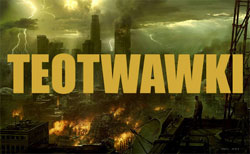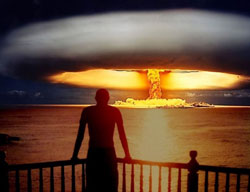JPMorgan Chase met à jour son règlement en cas de catastrophe nucléaire ou de troisième guerre mondiale
 En ce qui concerne les nouvelles les plus bizarres du jour, Hugh Son de Bloomberg a remarqué que dans un dépôt tardif le conseil d’administration de JPMorgan a approuvé une série de révisions concernant le règlement de la banque, y compris une révision particulièrement importante : une nouvelle section définissant le quorum dans une situation d’urgence résultant d’une « attaque contre les États-Unis » ou d’une « catastrophe nucléaire ou atomique ». Ce scénario figure parmi les urgences qui pourraient rendre difficile une réunion normale pour les membres du conseil d’administration de la plus grande banque américaine.
En ce qui concerne les nouvelles les plus bizarres du jour, Hugh Son de Bloomberg a remarqué que dans un dépôt tardif le conseil d’administration de JPMorgan a approuvé une série de révisions concernant le règlement de la banque, y compris une révision particulièrement importante : une nouvelle section définissant le quorum dans une situation d’urgence résultant d’une « attaque contre les États-Unis » ou d’une « catastrophe nucléaire ou atomique ». Ce scénario figure parmi les urgences qui pourraient rendre difficile une réunion normale pour les membres du conseil d’administration de la plus grande banque américaine.
La clause peut être activée non seulement en cas de catastrophe nucléaire ou de troisième guerre mondiale, mais aussi dans diverses situations, y compris « sans limitation, l’activité terroriste apparente ou la menace imminente d’une telle activité, les attaques chimiques et biologiques, les catastrophes naturelles ou autres dangers ou causes communément appelés actes de Dieu ».
En bref, le conseil d’administration de JPMorgan a décidé qu’il était temps de sérieusement envisager un scénario TEOTWAWKI (la fin du monde tel qu’on le connait).
Comme le souligne Son, dans ce cas, n’importe quel membre du conseil d’administration ou le comité d’exploitation de l’entreprise peut convoquer une réunion en utilisant « tous les moyens de communication disponibles ». Et au cas où tout le monde serait mort, une personne serait suffisante pour constituer un quorum. Les postes vacants peuvent être pourvus par un vote majoritaire des administrateurs disponibles. Et s’il n’y en a pas, alors les officiers désignés peuvent se présenter. Aucun dirigeant, administrateur ou employé ne peut être tenu responsable dans une telle situation, sauf pour « faute intentionnelle ». Un seul tondu peut décider de geler tous les fonds de la banque, s’il estime que cela est nécessaire dans pareil circonstance.
Les règlements d’urgence révisés sont reportés ci-dessous, en original en anglais :
« ARTICLE XI
Emergency By-laws
 Section 11.01. Emergency By-laws. This Article XI shall be operative during any emergency resulting from an attack on the United States or on a locality in which the Corporation conducts its business or customarily holds meetings of its Board or its stockholders, or during any nuclear or atomic disaster, or during the existence of any catastrophe or other similar emergency condition (including without limitation apparent terrorist activity or the imminent threat of such activity, chemical and biological attacks, natural disasters, or other hazards or causes commonly known as acts of God), as a result of which a quorum of the Board or the Executive Committee thereof cannot readily be convened for action (an “Emergency”), notwithstanding any different or conflicting provisions in the preceding Articles of these By-laws, the Certificate of Incorporation or the General Corporation Law. To the extent not inconsistent with the provisions of this Article XI, the By-laws provided in the other Articles of these By-laws and the provisions of the Certificate of Incorporation shall remain in effect during such Emergency and upon termination of such Emergency, the provisions of this Article XI shall cease to be operative.
Section 11.01. Emergency By-laws. This Article XI shall be operative during any emergency resulting from an attack on the United States or on a locality in which the Corporation conducts its business or customarily holds meetings of its Board or its stockholders, or during any nuclear or atomic disaster, or during the existence of any catastrophe or other similar emergency condition (including without limitation apparent terrorist activity or the imminent threat of such activity, chemical and biological attacks, natural disasters, or other hazards or causes commonly known as acts of God), as a result of which a quorum of the Board or the Executive Committee thereof cannot readily be convened for action (an “Emergency”), notwithstanding any different or conflicting provisions in the preceding Articles of these By-laws, the Certificate of Incorporation or the General Corporation Law. To the extent not inconsistent with the provisions of this Article XI, the By-laws provided in the other Articles of these By-laws and the provisions of the Certificate of Incorporation shall remain in effect during such Emergency and upon termination of such Emergency, the provisions of this Article XI shall cease to be operative.
Section 11.02. Meetings. During any Emergency, a meeting of the Board, or any committee thereof, may be called by the Chairman or any other member of the Board or the Chief Executive Officer, or any member of the Corporation’s Operating Committee (each, a “Designated Officer” and collectively, the “Designated Officers”), or the Secretary. Notice of the time and place of any meeting of the Board or any committee thereof during an Emergency shall be given by any available means of communication by the individual calling the meeting to such of the directors and/or Designated Officers who shall be deemed to be directors of the Corporation for purposes of obtaining a quorum during an Emergency if a quorum of directors cannot otherwise be obtained during such Emergency, in each case, as it may be feasible to reach. Such notice shall be given at such time in advance of the meeting as, in the judgment of the individual calling the meeting, circumstances permit.
Section 11.03. Quorum. At any meeting of the Board, or any committee thereof, called in accordance with Section 11.02 above, the presence of one director shall constitute a quorum for the transaction of business. Vacancies on the Board, or any committee thereof, may be filled by a majority vote of the directors in attendance at the meeting. In the event that no directors are able to attend the meeting of the Board, then the Designated Officers in attendance shall serve as directors for the meeting, without any additional quorum requirement and will have full powers to act as directors of the Corporation for such meeting.
Section 11.04. Amendments. At any meeting called in accordance with Section 11.02 above, the Board or a committee of the Board, as the case may be, may modify, amend or add to the provisions of this Article XI so as to make any provision that may be practical or necessary for the circumstances of the Emergency.
 Section 11.05. Management Contingency Plan. During an Emergency, the Corporation shall be managed by the Operating Committee under the direction of the Chief Executive Officer. In the absence of the Chief Executive Officer or his or her successor, the Operating Committee shall act under the direction of the Operating Committee member with the longest tenure with the Corporation.
Section 11.05. Management Contingency Plan. During an Emergency, the Corporation shall be managed by the Operating Committee under the direction of the Chief Executive Officer. In the absence of the Chief Executive Officer or his or her successor, the Operating Committee shall act under the direction of the Operating Committee member with the longest tenure with the Corporation.
Section 11.06. Liability. No officer, director or employee of the Corporation acting in accordance with the provisions of this Article XI shall be liable except for willful misconduct.
Section 11.07. Repeal or Change. The provisions of this Article XI shall be subject to repeal or change by further action of the Board or by action of the stockholders, but no such repeal or change shall modify the provisions of Section 11.06 of this Article XI with regard to action taken prior to the time of such repeal or change.
Section 11.08. Termination of Emergency. The provisions of this Article XI shall cease to be operative upon the termination of the Emergency as determined by a quorum of the Board or the Executive Committee thereof in accordance with Sections 2.06 and 3.01, respectively, of these By-laws. »
yogaesoteric
22 décembre 2017
